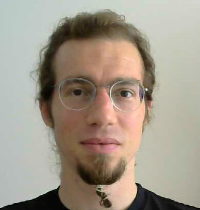
Carlos Esteban Budde
|
|
Education |
National University of Córdoba. Córdoba, Argentina.Faculty of Mathematics, Astronomy, Physics and Computer Science (FAMAF)PhD in Computer Science (2012–2017)
MSc in Computer Science (2010–2012)
BSc: Computer Analyst (2007–2010)
|
|
|
|
Academic career and teaching activities |
TeachingUniversity of Twente, The NetherlandsLecturing
Teaching Assistanships
Supervision MSc final projects
Supervision BSc final projects
Universidad Nacional de Córdoba, ArgentinaTeaching Assistanships
Supervision MSc final projects
Professional developmentManagement courses
Post-graduate courses
|
|
|
|
Research interests |
|
I evaluate properties formally on mathematical models using Monte Carlo simulation. My goal is to design a theory of automated algorithms for rare event simulation. I take good care to implement my ideas and test their performance in reality, on case studies as diverse as possible and largely focusing on high reliability systems e.g. described as Fault Trees. My techniques have demonstrated good performance for general stochastic models—i.e. any distribution you like—taking the same input as probabilistic model checking. I intend to extend the automated application of importance splitting to rare event analysis on hybrid systems, where currently only ad hoc approaches are applicable. Keywords: • rare event simulation • importance splitting • automation of Monte Carlo simulation techniques • formal methods in Computer Science • modelling of stochastic systems • process semantics • Stochastic Automata • GPGPUs for scientific computations • HPC.
|
|
|
|
Research work |
Publications (peer reviewed)Journals
Conferences
Workshops, book chapters, etc.
|
|
|
|
Memberships in societies and scientific committees |
Events organisation and chairs
PC member in conferences and workshops
Other contributions to the scientific community
|
|
|
|
Awards and honours |
|
|
|
|
Conferences and lectures |
Outreach & teaching extra-curricula
Participation in scientific eventsConferences
Workshops
|
|
|
|
Other work |
Participation in scientific projects
Peer-reviewer in journals
Peer-reviewer in conferences
Peer-reviewer in workshops |
|
|
|
Attachments |


